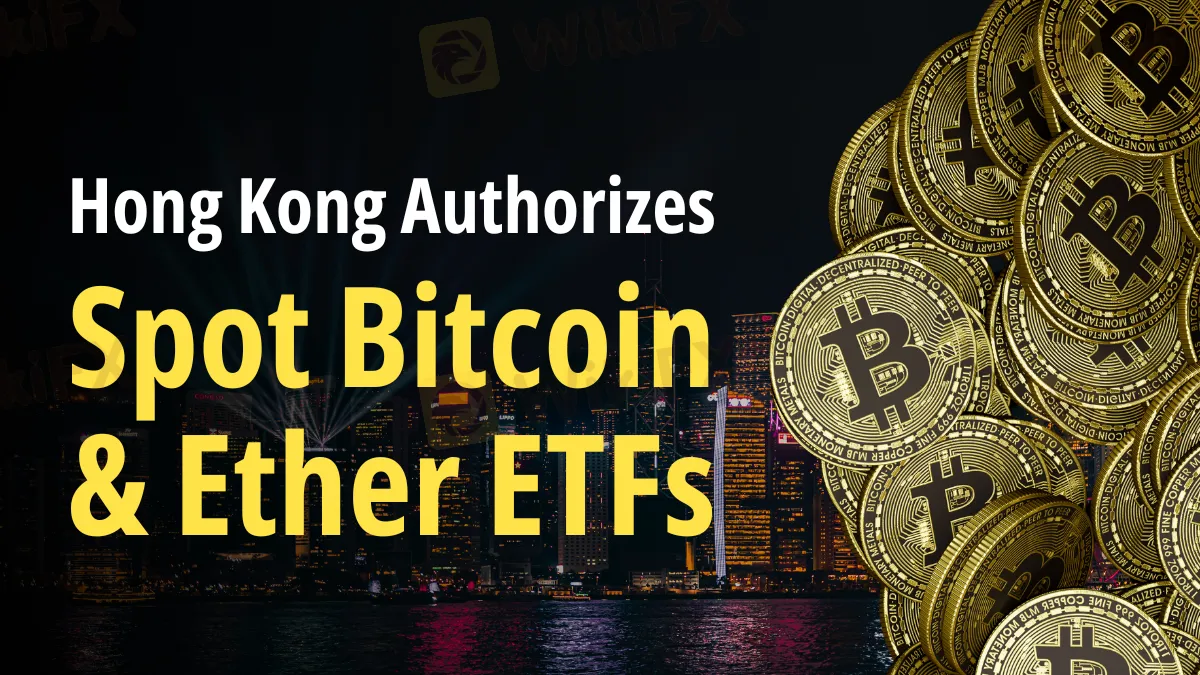简体中文
繁體中文
English
Pусский
日本語
ภาษาไทย
Tiếng Việt
Bahasa Indonesia
Español
हिन्दी
Filippiiniläinen
Français
Deutsch
Português
Türkçe
한국어
العربية
Hong Kong Authorizes Spot Bitcoin & Ether ETFs
Abstract:Hong Kong's Securities and Futures Commission approved three spot Bitcoin and Ethereum ETFs.

On Monday, Hong Kong authorities approved the first Bitcoin and Ether ETFs, expanding cryptocurrency investing prospects in Asia-Pacific. This approach may boost local and regional bitcoin markets.
In the past, the majority of Asian crypto ETFs were futures-based products. With the launch of these spot ETFs, investors now have direct access to Bitcoin and Ethereum via conventional financial methods, which is a significant change. This shift coincides with a 38% increase in the value of Bitcoin after the introduction of comparable funds in the U.S. earlier this year, while analysts warn that larger market variables also play a role in these price swings.
The prices of Ethereum and Bitcoin saw little rise following the news, but these gains quickly leveled out.
Despite current volatility, spot ETFs are likely to attract fresh money to cryptocurrency markets, similar to what occurred in the U.S. when spot Bitcoin ETFs quickly matched broad market fund inflows.
A small but growing share of the $12.7 trillion global ETF market is made up of crypto ETFs, with a market worth of around $85 billion. With $60.6 billion in assets, cryptocurrency-based funds now represent 0.68% of the US ETF market.

Hong Kong's newborn crypto ETF business is valued at $138 million, or 0.3% of the city's ETF market.
If the Hong Kong market expands in line with the U.S. market, analysts predict that it will reach a valuation of around $311 million. The Southbound Stock Connect program allows mainland Chinese investors to purchase shares listed in Hong Kong, and they estimate that there may be up to $25 billion in latent demand from these investors.
The regulatory authorities of Hong Kong did not anticipate approving these funds so fast; that occurred later in the year. Nevertheless, Hong Kong aims to position itself as a frontrunner in the integration of financial trading instruments that are closely associated with cryptocurrencies like Bitcoin by expediting the licensing procedure.
Critics have called these bullish projections “insane,” citing the speculative nature of the market. One such critic is Eric Balchunas, an analyst for Bloomberg Intelligence. Still, the latest regulatory approvals point to a growing recognition of crypto assets in international financial institutions.
Furthermore, this move coincides with the London Stock Exchange getting ready to accept applications for comparable ETFs next month, suggesting a rising trend worldwide toward the acceptance of bitcoin investment products.
Hong Kong-based principal asset managers like China Asset Management and Harvest Fund Management may handle portfolios with more than 10% virtual assets. Offshore Chinese financial institutions are interested in Hong Kong's expanding crypto asset market, which is notable considering mainland China's harsh cryptocurrency trading regulations.

Disclaimer:
The views in this article only represent the author's personal views, and do not constitute investment advice on this platform. This platform does not guarantee the accuracy, completeness and timeliness of the information in the article, and will not be liable for any loss caused by the use of or reliance on the information in the article.
Read more

MultiBank Group Wins Big at Traders Fair Hong Kong 2024
Discover how MultiBank Group, a global leader in financial derivatives, secured three prestigious awards at Traders Fair Hong Kong 2024, highlighting its innovative trading solutions and industry excellence.

CySEC Settles Compliance Case with Fxview Operator Charlgate Ltd
Discover how CySEC resolved compliance issues with Charlgate Ltd, the operator of Fxview, through a €50,000 settlement. Explore the investigation, regulatory measures, and CySEC's new website designed for improved accessibility and transparency.

TradingView Launches Liquidity Analysis Tool DEX Screener
Discover TradingView's DEX Screener, a powerful tool for analyzing decentralized exchange trading pairs. Access metrics like liquidity, trading volume, and FDV to make smarter, data-driven trading decisions.

What Are The Common Types of Unregulated Forex Brokers?
Protect your investments from unregulated forex brokers with these tips. Learn about red flags, scams, and how the WikiFX app ensures safe trading experiences worldwide.
WikiFX Broker
Latest News
Volkswagen agrees deal to avoid Germany plant closures
Geopolitical Events: What They Are & Their Impact?
Top 10 Trading Indicators Every Forex Trader Should Know
TradingView Launches Liquidity Analysis Tool DEX Screener
MultiBank Group Wins Big at Traders Fair Hong Kong 2024
WikiEXPO Global Expert Interview: Simone Martin—— Exploring Financial Regulation Change
'Young investors make investment decisions impulsively to keep up with current trends' FCA Reveals
Why Do You Feel Scared During Trade Execution?
CySEC Settles Compliance Case with Fxview Operator Charlgate Ltd
Malaysian Influencer Detained in Taiwan Over Alleged Role in Fraud Scheme
Currency Calculator


